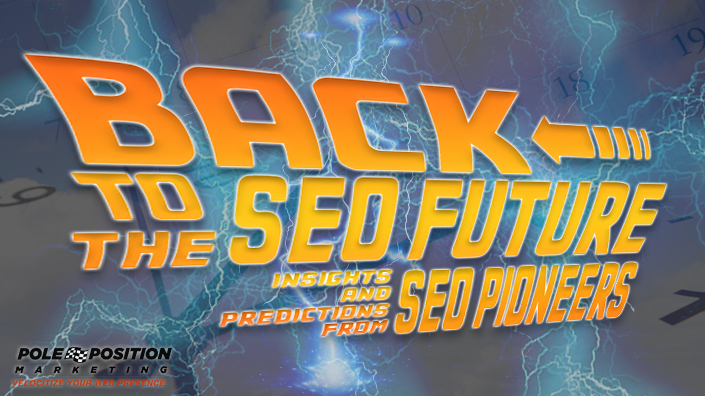
Last week, we listed some of the “SEO’s of the 90’s,” those who were in the industry before it was even called SEO and who are still “rockin’ it” today. The awesome thing about this industry is that there seems to be a particular willingness to help each other out. So when we reached out to these SEO’s, we not only found several who were willing to answer some questions about the past, present and future of SEO, but they went above and beyond, as you will see from their extensive answers below. These people are legends, and we are honored to feature their insights here.
Adam Audette
Reg Charie
Christine Churchill
Bruce Clay
Stoney deGeyter
Ammon Jones
Heather Lloyd-Martin
Danny Sullivan
Adam Audette
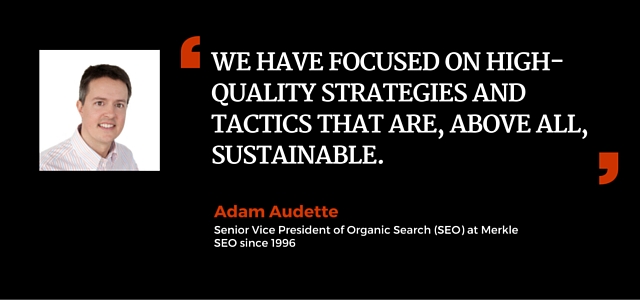
1. Many SEOs have come and gone. What makes you different and has allowed you to survive?
We have focused on high-quality strategies and tactics that are, above all, sustainable. We go deeper into technical SEO than probably 95% of other agencies and consultants. We have a content strategy approach that focuses on users and digital experiences, not on creating content for links. We’ve never had a link building service, focusing instead on creating content that engages and letting the chips (and the links) fall where they may . We are now far ahead of the curve in understanding how to apply addressable, personalized content experiences that rank very well in organic search. We have a large SEO team of almost 90 smart people and work with the world’s leading brands.
2. What has surprised you the most about the evolution of SEO?
How there has never been a meaningful competitive threat to Google in search.
3. What predictions do you have for the future of SEO?
Lots more on structured data. Lots more on dynamic sites and single page applications. Apps and deep link indexing. Voice search rising. Mobile taking over SEO until eventually there’s a “multi screen” approach that takes into account mobile, tablet and desktop without such separate approaches as today (responsive notwithstanding). Better tools to leverage addressable, personalized experiences in organic search.
4. What advice do you have for SEOs today?
Focus on the technical stuff. Understand Google can render the DOM, know what that means. Get heavy into structured data. Move away from the idea of building “links” and instead focus on user experience and data-driven content strategy. Be thinking about how addressability can be applied to SEO. Think of how you can make sites fast, fun and easy to use.
Reg Charie
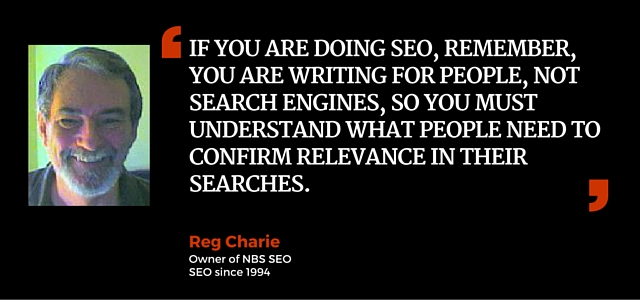
1. Many SEOs have come and gone. What makes you different and has allowed you to survive?
I guess the main thing is that I devote a lot of time and effort into studying all things related to SEO and, over the years I have done a huge amount of testing which has led to my being able to get top listings. I started doing SEO before Google. (I actually started doing database work in ’84.) I don’t “follow the herd”. I prefer to judge my methodology based on results.
2. What has surprised you the most about the evolution of SEO?
I guess the biggest surprise is Google’s abandonment of their PageRank system. I did not expect their text recognition to become as accurate as quickly as it has.
3. What predictions do you have for the future of SEO?
SEO is here to stay. Without basing the results on page popularity, on-page work, both in the code hierarchy and the visible display elements, becomes paramount.
4. What advice do you have for SEOs today?
My advice to SEO’s is READ everything Google publishes about SEO. Read their Patents and information releases. Don’t take the advice of Googlers who answer questions online at face value. There are often hidden meanings and misdirects. Google does NOT want you to understand how their algos work. They go out of their way to perpetrate false avenues of information. They have even gone as far as to introduce a Rank Modifying Algo that give a document a transitional rank that changes over time. Their patent’s description reads:
“A system determines a first rank associated with a document and determines a second rank associated with the document, where the second rank is different from the first rank. The system also changes, during a transition period that occurs during a transition from the first rank to the second rank, a transition rank associated with the document based on a rank transition function that varies the transition rank over time without any change in ranking factors associated with the document. “
See Google “Google’s Rank Modifying Patent for Spam Detection” for more information. My article http://seo-mentoring.ca/
If you are doing SEO, remember, you are writing for PEOPLE, not search engines, so you MUST understand what people need to confirm relevance in their searches. Above all, you must tell Google and the Human visitors EXACTLY the same thing. Use your h tags to specify importance along with position and decoration. Google judges SEO on what is visible to the human visitors. Markup can help, but less than is rumored.
Christine Churchill
1. Many SEOs have come and gone. What makes you different and has allowed you to survive?
Online marketing is one of the most dynamic and fast paced industries in the world. One needs a desire to keep learning and evolving in order to stay relevant and current. We have to keep pushing ourselves to learn new things and expand our expertise in areas that didn’t exist a few years ago, while adapting and dropping outmoded, deprecated tactics of the past. Blindly following outdated SEO practices from even just three years ago is a recipe for disaster.
I think I was lucky in that one of the strongest evolving trends in online marketing – the goal to create web pages and content with a user-centric focus – overlapped with a personal interest of mine. I took a lot of psychology in college and always had a fascination with behavior and motivation. Online, this interest manifested itself in an interest in usability and how people behave while interacting with a web page. I started doing live user tests back in 1999 and discovered the high quality of the information derived. Early on, I was testing and tweaking pages to perform better for users, and this is exactly the direction in which Google and other engines have been moving. I’ve maintained user testing as a major component of my online marketing strategy ever since.
2. What has surprised you the most about the evolution of SEO?
There is an old saying, “The more things change, the more things stay the same,” and I’ve been seeing where this is true in SEO. Yes, the world of SEO has evolved dramatically and you have to do more to succeed than in years past. None the less, many core components of SEO are still vitally important. For instance, the Hummingbird algorithm was an overhaul of Google’s ranking algorithm, but many things did NOT change. The new algorithm still incorporates many of the basic ranking factors from the past. Because of this, you can’t abandon good SEO practices, but you do need to keep current on which practices are being deprecated.
A good, quick rule of thumb is this: If the change you are making is visible to the customer (things like title tags, font sizes, anchor text, etc.), this will likely be an SEO ranking factor for a long time. Sneaky, invisible practices like inbound links from spammy sites, overriding fonts or visibility via CSS, cloning pages across many domains, etc., either are or will be deprecated, if not actively penalized, by the engines once they determine how to identify these tactics. I firmly believe in SEO for the long haul, so I avoid spammy, short-term tactics in SEO.
For example, say you redesign your web site and in the process most of your URLs change. One of the smartest things you can do is to set up a mapping document that takes into account old URLs and where that old page should point to on the new site and then set up redirects so the search engines can find the correct pages. This is a basic SEO best practice, yet time and again I see companies plowing on with a site launch without doing their homework. Then they wonder why they are taking a traffic hit or why their analytics are showing tons of 404 errors.
The morale of the story is you have to do all the new stuff (build for mobile and for the user, develop great content, be active in social media), PLUS you have to follow the old SEO best practices. It is more work to do it all, but if you want the payoff, you have to earn it.
3. What predictions do you have for the future of SEO?
There are several studies predicting that mobile search will outnumber desktop search in 2016, and I totally believe that trend is spot on. For some of our clients, this has already happened. Mobile, voice search and the importance of building sites and content to answer user intent are going to continue to be hot growth areas.
Another trend is Google returning more and more direct answers. Right now, close to 20% of searches return direct answers, and since Google benefits from answers, we don’t see Google abandoning direct answers. Marketers need to get smarter and learn to work with direct answers and the knowledge graph. Using techniques like structured data can help your site be the source of the direct answer. In many cases, Google links to the source – so being the source can turn the situation into a positive.
4. What advice do you have for SEOs today?
Be well rounded and keep learning. Many new folks in the industry get pigeonholed into a small niche. If the last 20 years of online marketing has taught us anything it is that the marketers who have talents in many areas and are flexible survive the changes. While it is good to have a core expertise, push yourself to develop a larger holistic view of how components interact online.
Bruce Clay
1. Many SEOs have come and gone. What makes you different and has allowed you to survive?
I’ve always focused on knowledge transfer. Bruce Clay, Inc., actually got on the map in the early days of SEO by publishing one of the first infographics, the Search Engine Relationship Chart. See the full historic version with 20 some search engines like Netscape, Lycos, HotBot and AltaVista all feeding into each others’ indexes here: http://www.bruceclay.com/serc_histogram/histogram.htm. People were hungry for information on how search engines worked when we first published that infographic in 2000, and they still are today.
Our company website is a learning center that’s rich with SEO tutorials and practical marketing advice. Through our blog at BruceClay.com/blog and monthly SEO Newsletter, we publish information that helps people stay on top of the industry news. We’re committed to upholding our reputation as the best classroom and onsite training programs at conferences around the world because knowledge transfer communicates a high-level of expertise.
2. What has surprised you the most about the evolution of SEO?
A couple things come to mind. I didn’t expect to see Google move away from its support of organic sites. One of the biggest ways we’ve seen this is Matt Cutts stepping away from the Google web spam team. I didn’t think that the spokesperson for Google would become a multi-person job by people who aren’t part of the spam team. I wouldn’t have predicted Google could improve spam detection enough to reduce their team of quality protectors.
3. What predictions do you have for the future of SEO?
In 10 years, I think we will all have Internet connected implants or wearables, and we will be able to talk to any object that has a wireless processor. We will be able to ask questions and get answers from a refrigerator or a watch. That means websites and applications may not be the primary way that people connect online.
Google wants to be the source of all knowledge, and it plans to make money by answering our questions, no matter the object. While the Internet of things will change SEO, it’s likely that Google will still depend on websites for information and will strive to be the presentation layer for those answers.
The real question is: how is Google going to make money in two years? The goal is to answer that question and get there first. Two years from now, I believe Google will be earning revenue on every square inch of a mobile search results page. It can make the most money through local results. As a result, I predict that local search will develop into a directory and companies will pay Google to be included prominently in that directory.
Many technological advancements like voice, local and mobile are already changing SEO and will continue to do so. We don’t have to look too far ahead to see changes in SEO.
4. What advice do you have for SEOs today?
I can think of a few tips. First, get technical. SEO is becoming more technical by the minute. At one time, it was enough for an SEO to simply know how to open up an HTML file, change the information and see results. Today, websites are built from many sources, which makes it vital for SEOs to know servers, content management systems (CMS) and ecommerce platforms.
Second, know more than just SEO. The practice of SEO is now intertwined with other elements of Internet marketing optimization. A successful SEO today is one who has a solid grasp of PPC, analytics, content and social – multi-disciplinary Internet marketing optimization. Nearly anyone venturing into digital marketing will need to embrace more than SEO, especially in the mobile connected environment.
Stoney de Geyter
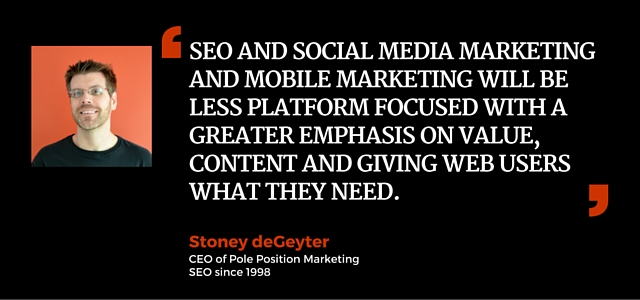
1. Many SEOs have come and gone. What makes you different and has allowed you to survive?
The “what sets us apart” question can be answered in two distinct parts. The first is external, the way we operate that matters to cleints. The second is internal, the way we operate that matters to our team.
For the clients, our difference is in how we are organized as a company. A lot of agencies out there hire jacks of all trades. You’ll have one person responsible for the bulk of the web marketing campaign, and it’s their job to handle on-page optimization, social media marketing, paid ad marketing, etc. While that can make things convenient for a client in that they only have one person to go to for any issues, it’s just too difficult for one person to be a true expert in every discipline of web marketing.
Pole Position Marketing hires (and trains) experts in specific disciplines who all work together for each web marketing account. As project manager, I act as the primary client liaison. However the client has direct access to and often works directly with each of the team members as needed. The client, therefore, gets a dedicated expert in each area of web marketing, something they could not get if they hired one or two people internally. That makes our team an extention of their own internal marketing team.
Our internal company structure is also somewhat different from what I have encountered elsewhere. And while none of this is client-specific, we fully understand that how we operate internally does effect our productivity and performance.
To start, we require all strategists to complete 5 hours of education each week. This is built into their weekly work expectations, not something we hope they do at home on their own time. It’s paid education time.
While many companies work either fully on-site or fully independent of an office, we do a mixture of both. I have found that even with all the technology available, it can be difficult for strategists to connect and collaborate on a regular basis when they don’t get a chance to work together. There is just something about being in the same room as someone, sharing jokes, stories and strategies that helps a team gel. At the same time, there is definitely a benefit to being able to work on your own schedule where one is most productive.
Our team works together in the office two days per week, and the rest of the week they work from their home offices. That allows them freedom to be productive wherever they have fewer distractions most of the week but gives us the collaboration and team building time we need for the rest.
As for the question on why PPM has survived when others have not, I think the simple answer is that we have always focused on the client’s success. It’s easy to set up benchmarks that look good on paper but don’t translate to growth for the clients. We realize that those faux benchmarks are a recipe for high client turnover.
Right now, PPM has several clients that have been with us for well over ten years. That’s the kind of longevity we seek, and we do that by focusing on the client’s business goals rather than goals that simply make our web marketing team look good.
2. What has surprised you the most about the evolution of SEO?
I can’t say I’m really surprised by anything specifically. As things change around you, you just kind of flow with it.
But what I do think I’m surprised about is the evolution of technology that Google and other companies have developed. I’m starting to feel like we are live in the first act of those apocalyptic movies from the 80’s and 90’s. I am literally getting worried when I see companies like Google (sorry, Alphabet) become such monopolies, and at the same time diving headlong into robotics and artificial intelligence. Seriously folks, hasn’t Hollywood given us enough scenarios to see how this plays out? Whether it’s the robots that take over or the corporations, it doesn’t matter. Add to that the amount of privacy we are giving away with our phones now in constant listening mode and smart TVs monitoring our actions in our own home . . . We are selling our freedom for convenience!
Phew. I’ll step off the soap box now.
3. What predictions do you have for the future of SEO?
I’ve never really been one for predictions, but I’ll take a non-conspiratorial stab at it. Mobile will, of course, continue to be important, thought it won’t be called mobile marketing, it will just be called “marketing.”
I think the one thing we have already seen and will continue to see is the fracturing of the audience making marketing much more difficult. The easiest way to see this from recent history is the move from a few channels available on TV to hundreds. Advertisers had to start splitting their budgets up in new and more creative ways. We are seeing that in the web as social platforms open up new opportunities. Those platforms and the search engines are becoming more personalized in what they show users. The more personalized everything gets, the more marketers have to focus on the customer rather than the platform.
SEO and social media marketing and mobile marketing will be less platform focused with a greater emphasis on value, content and giving web users what they need. That’s not to say good marketers have not been doing that already, but that will only become more important and make marketing more difficult overall.
4. What advice do you have for SEOs today?
Know your stuff and focus on the customer. If it’s a win for them, it’s a win for you.
Ammon Johns
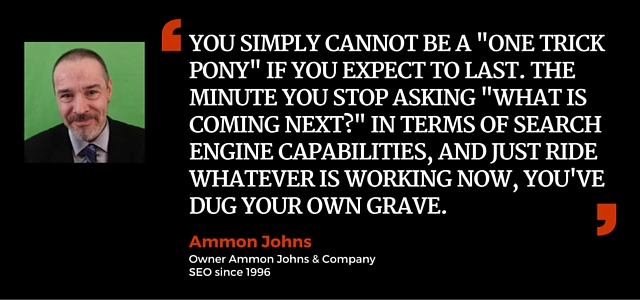
1. Many SEOs have come and gone. What makes you different and has allowed you to survive?
This is the question I’ve asked myself the most often. After all, if I don’t know what it is, how can I keep doing it? I think it is a combination of things, but by far the most important is that I am always learning, researching, looking ahead. You simply cannot be a “one trick pony” if you expect to last. The minute you stop asking “What is coming next?” in terms of search engine capabilities, and just ride whatever is working now, you’ve dug your own grave.
The next important factor is to always remember that search engines are built by people. Smart, passionate people who are as enamored with their side of the business as any SEO should hope to be with their own side. Understand that there are people on all sides of search — the search engine, the users of search and the businesses that want to get sales from search. Each side is focused on their own objectives, their own needs. A great SEO is one who can step above the trenches and see where their needs and desires align, find the common ground. SEO has to serve all three masters: You have to create rankings that search engineers don’t hate and penalize, that search users want and respond to, and that drive the business goals of the website. If you fail in any one side of those three, your SEO campaign is a failure, because while the saying “two out of three ain’t bad” has some truth, “not bad” is not enough to be “optimal.”
The least discussed factor is the companies that employ SEOs. Whether in-house or agency, there are still too many SEOs who are set to work every minute on paid campaigns and thus have no research time. They are expected to train themselves in their free time. No other industry I can think of takes such a foolish view, and the result is that many SEO companies and agencies constantly push their staff into being out of date and obsolete in practices. Every SEO who wants to last any time at all needs to be constantly looking ahead at what is coming next. Every agency or company that wants their SEO to be effective beyond the short term must also embrace that need for research and learning.
2. What has surprised you the most about the evolution of SEO?
That depends on whether it is the most amount in a single surprise, or the most surprises and total amount of surprise over time.The most frequent and total surprise over time has been how slow the majority of the SEO industry can be to catch on to change. I constantly see some companies and individuals using techniques and practices that are years out of date, and years in SEO are like decades in other industries. Of course, a lot of this comes from self-taught SEOs basing their knowledge on articles and blog posts that are themselves out of date, and regurgitating the same outdated ideas as a fresh blog or forum post of their own, making the outdated practice seem fresh and continuing the cycle. Bad practices and second-hand knowledge are things that continually surprise me when so much information is available, and the idea of testing for yourself is hardly novel.
However, the biggest single surprise was probably in just how much personalisation has come into search. I had believed that personalisation would be big, but I had expected a lot more resistance to search engines collecting the volume of personal data they do. It creates this strange dichotomy where, on the one hand, Google hides the keyword referrals from analytics, yet on the other, allows retargeting of search ads to apply only to people who visited a certain site within a certain time-frame (which is a lot more personal and creepy if you think about it).
3. What predictions do you have for the future of SEO?
First, that the speed of change will only increase. Exponentially. As machine-learning comes more and more into play, changes can happen at machine speeds. An algorithm change could be tried, tested, adapted, retested, reapplied and refined in the course of just hours in some cases.
Second, that intent-based and semantic search will continue to grow in importance. More and more the search engines want to provide the ‘one perfect answer’ rather than a whole range (except of course in cases where a range of options is the perfect answer). This means that where search used to be about better understanding the document, and then better understanding the network of the web, it is now more about understanding the searcher, what they really want and what they tend to prefer. It is less about the “ten blue links” and more about asking a question and getting one clear, concise, well-presented answer.
Third, that mobile is not just about smartphones. Wearable technology is coming and will not be limited to watches. The earphone that can offer you a personal assistant anywhere and everywhere like JARVIS to Tony Stark is not far off. SIRI and Cortana are just the first steps, and bear as much relation to what is coming as a ‘speak-n-spell’ does to a laptop computer. Those devices themselves are going to be the new users of search, constantly getting data about things that might matter to you, even before you know you need to ask. So as you enter the supermarket, it can compare what you usually buy to what is on offer there, and suggest buying some items at another supermarket you use if they are cheaper there. It isn’t search exactly, but it is still Information Retrieval, which is the heart of search.
4. What advice do you have for SEOs today?
Learn your craft before tooting your horn. I have long regarded it as taking 3 years of experience to become a junior SEO. Before that, you are simply a trainee, and there’s nothing to be ashamed of in that. The reason it takes so much experience is because SEO touches on so many other skillsets, from web design and development (knowing code enough to improve that of a professional designer with specific regard to SEO without breaking usability or creating cross-browser issues, etc.) through psychology (you must understand user intent today and the behaviours of the buying process).
Some people say that specialization is the key, a way to beat that need for so much experience, but that isn’t true. To be a specialist, you have to be as good as the best in that specialization. Until you are an expert, equal to the best of the best in one specialized area, you are not a specialist, just a trainee who has only really gotten to know one part of the picture. People don’t hire a specialist in SEO to do what a generalist can do better.
Most important of all, build and run your own sites. By build, I mean from scratch in the code view, preferably in a plain text editor like notepad. Installing WordPress and add-ons is not building sites. Your own sites are where you can play and test things freely, without any risk to clients. As you know them intimately, you can get an instant ‘feel’ for algorithm changes from how they impact your own various test sites because you know their entire history.
Reading what other SEOs say or share is not ‘learning’ SEO. It is accepting what you are told. The learning comes from applying and testing what you read for yourself and pushing the envelope a bit, creating your own tweaks, and discovering exactly where the borders are. Build a variety of sites, some small, some less so. Some about hobbies and interests, maybe a fan site, and try an affiliate site or two. Create a broad range of topics and verticals, because then you’ll see when commercial sites behave differently (as with Google’s “Your money or your life” algorithms), or when a particular topic is affected by a news boost, etc.
Start with code, because it is the building blocks of everything else. Learn HTML, CSS and Javascript, and push yourself to constantly improve. Then master analytics so that you never ever accept Google’s default options, and know how to measure engagement, scrolling, return cycles, etc. From there, it is about always pushing further into learning marketing and psychology because what people search for is less important than why and how.
Heather Lloyd-Martin
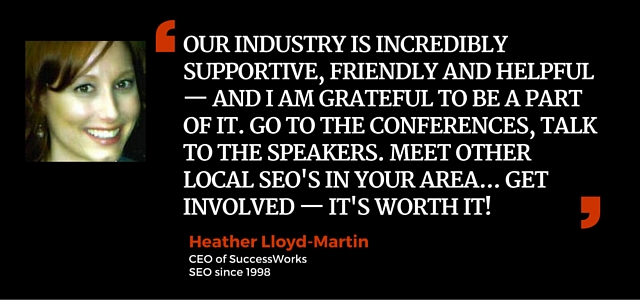
1. Many SEOs have come and gone. What makes you different and has allowed you to survive?
My first answer to this question was, “Well, it’s because I’m stubborn!” 🙂 But in reality, I think a couple things have come into play:
- I’ve changed focus when it’s made sense to do so. I used to write 100% of the time. Now, my time is spent consulting and training. Which is cool — I love consulting and training. Especially training! Certainly, I’ve had my burnout times when working at Starbucks seemed like a better alternative. The key for me has been to pay attention to the market, focus on fun projects and do things I love to do. That’s kept me going.
- I never spread myself thin and tried to be a one-source shop offering technical, PPC, design, etc. Some companies have done really well with that approach. But for me, I wanted to stick with what I really enjoy — which is helping in-house and freelance writers write fantastic, standout content. I can still learn new things and teach them to my students. But I’m not trying to do and learn everything.
2. What has surprised you the most about the evolution of SEO?
In a way, nothing has surprised me…which is a positive (and negative) of being around for so long. Having said that, it was surprising that Google took so long before they started to devalue thin, useless content. Unfortunately, that’s about the time that content almost became a commodity and companies were looking for the “quick and fast” writer. Content wasn’t written for readers…it was written to satisfy the Google gods.
High-quality content is finally being emphasized and rewarded again. But it took some time. And, sadly, that “quick and fast” mentality is still out there…but, I’m glad to see it’s not everywhere anymore.
3. What predictions do you have for the future of SEO?
Ah, the million-dollar question. Content will still be important. Google will slightly change its guidelines and revise the algorithm. New strategies will be developed and out-of-date ones will be retired. In short…the same as it ever was!
4. What advice do you have for SEOs today?
At the risk of sounding like an old person screaming at kids to “GET OFF MY LAWN,” I would say “know your SEO history.” I’ve seen many an SEO newbie excited about a “special technique” that’s been considered spam for years. Or, I’ve seen folks discounting the advice of an SEO veteran because he/she is over 35 and “doesn’t get the new Google.”
Granted, the “old” folks aren’t always right — and SEOs with a fresh perspective can often tackle issues in an incredibly innovative way. A mix of knowing the history and seeing the industry with fresh eyes is a very powerful combination.
Now, can someone please turn that music down? 🙂
My second piece of advice is to get to know your colleagues. Our industry is incredibly supportive, friendly and helpful — and I am grateful to be a part of it. Go to the conferences, Talk to the speakers. Meet other local SEO’s in your area. It’s one thing to be part of a community. It’s another to be an active member. Get involved — it’s worth it!
Danny Sullivan
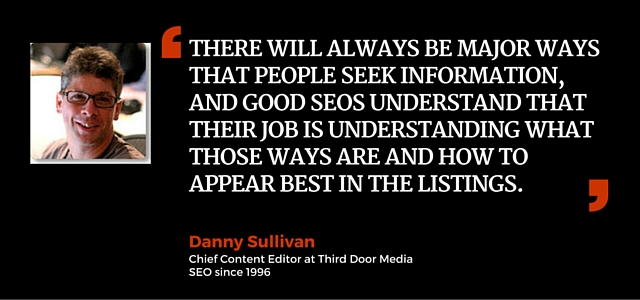
1. Many SEOs have come and gone. What makes you different and has allowed you to survive?
My prediction is that there will always be major ways that people seek information, and good SEOs understand that their job is understanding what those ways are and how to appear best in the listings. If you understand this, that’s how you survive long-term. You get that your job isn’t figuring out how to rank best on Google (or OpenText, Yahoo, Excite, etc) but how people search and how the major search players operate.
2. What has surprised you the most about the evolution of SEO?
The emergence of one single dominant search engine, Google, probably surprised me the most. I began at a time when we had many major search engines. Second to that is probably how much we’re now transformed by always-on mobile searching.
3. What predictions do you have for the future of SEO?
I expect mobile will continue to grow in how we search and the ways information are presented will change. I still expect we’ll see more reliance on social signals as part of ranking. And honestly, no idea in the long-term. I don’t know that anyone knows.
4. What advice do you have for SEOs today?
Do what I said in 1 🙂

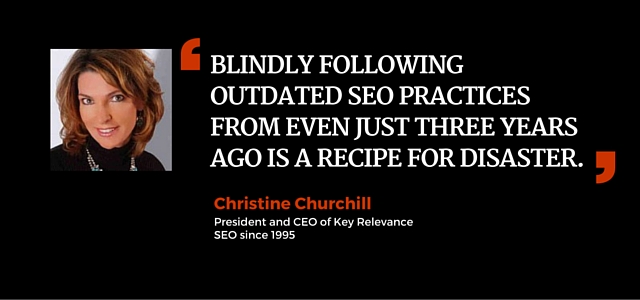
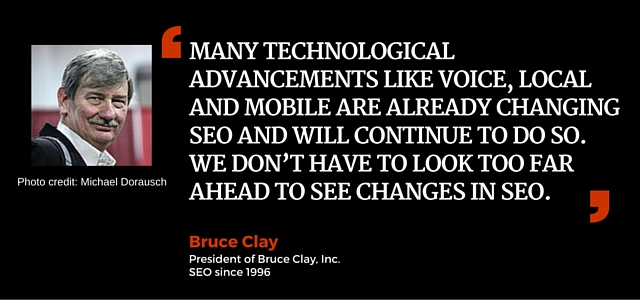
3 Responses to Back to the SEO Future: Insights and Predictions From SEO Pioneers